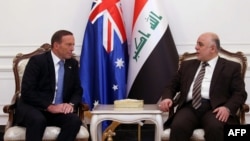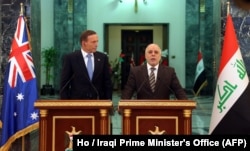Australian Prime Minister Tony Abbott has promised the Iraqi government more help to fight Islamic State militants. Abbott made the pledge Monday during a previously unannounced visit to Iraq.
The Australian government already has joined U.S.-led airstrikes against Islamic State targets in northern Iraq. It has also promised to send 200 Special Forces soldiers to act as military advisers to the Iraqi army.
On Monday, Abbott made his first visit as Australia’s Prime Minister to Baghdad, and has promised his counterpart Haider al-Abadi that Canberra would do what it could to help defeat Sunni militants who have seized large parts of Iraq and neighboring Syria.
Abbott says the Iraqi people continue to be oppressed.
“Iraq is a country which has suffered a very great deal. First, decades of tyranny under Saddam Hussein, then the chaos and confusion that followed the American-led invasion. Most recently, the tumult, the dark age, which has descended upon Northern Iraq as a result of the Daesh death cult,” he said.
Prime Minister Abbott said efforts to defeat IS are not just a struggle for Iraq, but a global fight, adding that the Sunni militants had “declared war against the world.”
During his visit to Baghdad, Abbott also met Iraqi President Fuad Masum, and was briefed by U.S. and Australian military commanders and spent time with Australian forces at their base in Iraq.
Australia will also donate another $4 million in humanitarian assistance to help feed hundreds of thousands of Iraqis who have been displaced and had crops destroyed by terrorist attacks.
Australia’s support for the U.S.-led campaign against Islamic State militants stems from a longstanding military alliance dating back to the early 1950s.
In recent months, Canberra has passed new counter-terrorism laws in an attempt to stop young Australians travelling to join militants in Iraq and Syria. Last year, Canberra raised its domestic terror threat level from medium to high because of concerns about home grown extremism.
Critics of Australia’s military involvement in Iraq insist it has made Australia more of a target for terrorists.





